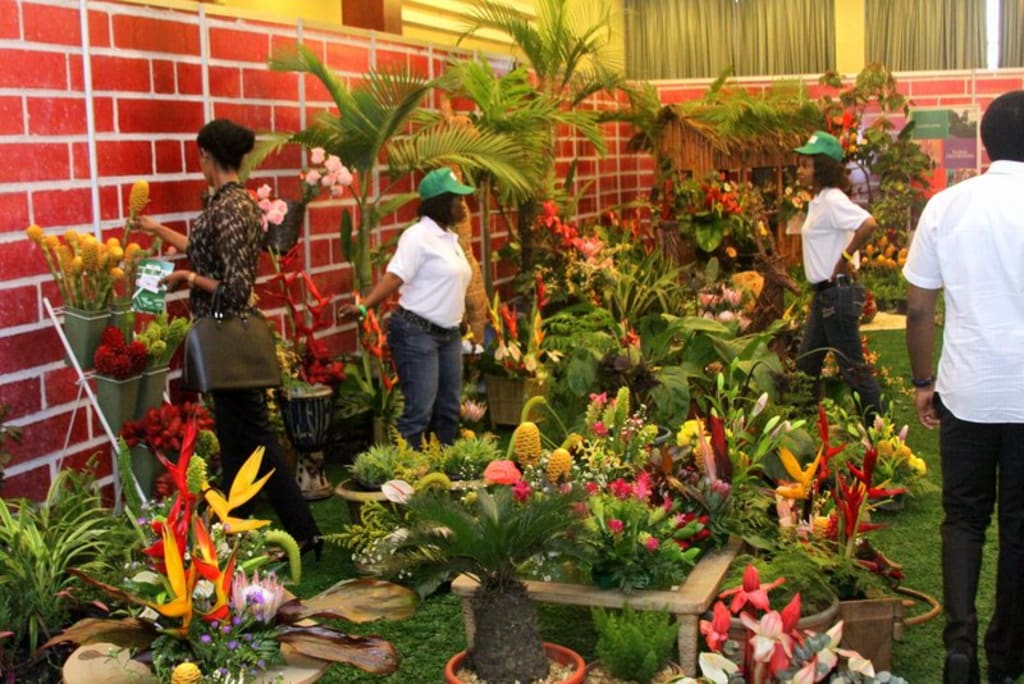Growth in Nigeria's Cut-Flower Export and Earnings.
Talks With the CEO of Asparai Gardens, Pwachom Jooji.

From what I have been hearing recently, the flower gardening business in Nigeria is one of the coolest businesses you can start today and make cool cash all year round. According to experts in the business, flower gardening is a lucrative business in Nigeria that requires little or nothing as startup capital. However, you must have passion for the business in order to make a profit out of it.
Flower gardening and floral arrangements is a business that has been yielding billions of dollars for smart entrepreneurs in developed countries in Europe, America, and Asia, and Nigeria is beginning to wake up to the potential. The art of flower gardening requires plenty of patience, care, and a desire to nurture and grow a flower, first as a seed and then as a flowering plant. And with this patience comes lots of monetary rewards- or so they say.
For more than 200 years, the heart of the global trade in cut flowers has been the Netherlands. The world’s largest global auction for flowers began, famously, in a pub. One trader turned to his peers and asked, how much?
The question was the start of the most dynamic and highly organized trading sites for flowers in the world. Now known as the Royal FloraHolland auction house at Aalsmeer, near Amsterdam, the floor of a cavernous warehouse is home to a giant game of Tetris with living flower stems bustled about on trolleys, to be bought, sold, and dispatched.
As it has done for years, Royal FloraHolland still plays a critical role in importing and then re-exporting 40% of flowers from all over the world. But newer players in the flower trade are making their presence felt, shifting the dynamics of production. As transport technology develops, producers in regions elsewhere, including sub-Saharan Africa, are challenging the Netherlands’ traditional hold on the industry. The scale of the global market for cut flowers is large, and increasing. In the UK alone, the market for cut flowers and ornamental plants was worth £1.3 billion in 2018, according to government statistics. Around 90% of these flowers are imported – the vast majority still coming via the Netherlands. In 2015, the global trade in flowers was worth around €15bn (£10.6bn), with stems shuttled between continents with breath-taking speed.
Keeping up with the world’s demand for flowers involves an intricate and delicately balanced supply chain of workers, farmers, wholesalers, airlines, cargo ships, traders, florists and supermarkets. Getting something as delicate as a bunch of flowers from one continent to another without them being crushed or wilting is a daunting technological feat.
Cut flowers have to be transported quickly using a “cold-chain” – a series of refrigerated facilities on farms, lorries, planes, and boats – which put the flowers into a dormant state, so they stay fresh. This allows a rapid transfer from farm to shop within 24-48 hours, if going by plane, says Sylvie Mamias, secretary general of Union Fleurs, the international flower trade association.
Time is critical: for every extra day spent travelling flowers lose 15% of their value. Vase life – the length of time flowers stay fresh after reaching the customer – is then usually 12-15 days, Mamias says.
The biggest buyers of cut flowers are the EU and the US, but the biggest growers and exporters are the Netherlands, Ecuador, Colombia, Kenya and Ethiopia. Roses, carnations and chrysanthemums are the most popular blooms.
In the UK, 80% of cut flowers come via the Netherlands, according to the British Florist Association, although a significant proportion originate in Kenya. Some Kenyan flowers also come straight to the UK on direct flights from Nairobi, where entire terminals at certain airports are dedicated to flights exporting blooms.
One of the reasons behind the increase in flower exports in Africa dates from the 1970s, says Mamias, when an oil crisis increased the cost of heating greenhouses in northern countries. As a result, production moved south where flowers could be grown with little energy input all year round. For Europe, this meant seeing more flowers imported from Israel and Morocco, and later east Africa, while US buyers developed trade with Latin America.
These new producers had three things in common: areas of high altitude with cool nights, which many flowers benefit from, proximity to the equator for maximum hours of sunlight, and cheaper labour. The change also meant an end to seasonal production and the beginning of a 365-day-a-year international competitive trade.
Kenya is particularly important as a source of roses – the country supplies one-third of all roses sold in the EU, according to Union Fleurs. Cut flowers are now Kenya’s second largest export after tea, contributing around 1% of the country’s GDP. They are also one of the country’s largest sources of employment, with over 100,000 people working directly in the flower industry and an estimated two million indirectly.
-https://www.bbc.com/future/bespoke/made-on-earth/the-new-roots-of-the-flower-trade/
Being so curious about the flower market in Nigeria, I connected with another old schoolmate and acquaintance who owns a leading flower business in Abuja, Nigeria. Her name is Pwachom Jooji and, she is the CEO of Asparai Gardens.
Cathy Ben-Ameh: Hi Pwachom. Thank you so much for taking the time to chat with me about what you do.
Pwachom Jooji: Hi Cathy, glad to see you again after a long time. I’m glad to do that.
Cathy Ben-Ameh: I have read that a simple flower pot is sold for N2,000 in Ikeja GRA depending on the flower specie, while a flower bouquet goes from N15k and above. Word on the street is that 20 bouquets sold in a good month will fetch you N300k+ without breaking a sweat. How true is this?
Pwachom Jooji: okay, I’m a florist, I don’t do gardens yet only if asked for consultations. I create bouquets, floral arrangements with fresh-cut flowers. Yes from your analysis 20 bouquets in a month can fetch you about N300k + but I still feel you need to break sweat 😁. You have to showcase your creativity in flowers and express why flowers should be bought especially in Nigeria. We do more over Valentine's season and you can still make more than N300k in a month depending on how well you push yourself out there.
Cathy Ben-Ameh: Many Nigerians are not yet in tune with the use of flowers with some even seeing it as a luxury. The good news is that there are millions of people in many places in the country who appreciate and adore flowers and are ready to spend fortunes to buy them. How have you overcome this social hurdle and grown your business so far?
Pwachom Jooji: The social hurdle is still present in Nigeria. I would say as florists we are still trying to overcome it. You can’t force everyone to buy but the market size that is interested and express interestin your niche and love how flowers are used to express themselves, fall in love with flowers again and again. Flowers are just naturally a beautiful sight to behold. Some people can’t wrap their heads around it but those who are in love with it or want to try it are happy and love the feeling that comes with it.
Cathy Ben-Ameh: Where did you get the training needed to grow flowers? How would suggest others who are interested acquire theirs?
Pwachom Jooji: As I said earlier, I’m a florist. I started out learning on my own then furthered my training with Mrs Lily Abayomi, the CEO of The Flowershop by LC. I would suggest you can pay for training which is a bit expensive or you can go learn by being an intern with a good florist and gain experience. After I trained with her, I still was going to her flower shop to train because there were some techniques I never knew about and gained experience. I’m still learning with her and also online lol. Especially from good florist, I see their works.
Cathy Ben-Ameh: Nigeria's flower market has a lot to learn from South Africa which started in the 1940s and Kenya which is also a leading competitor. What can the Nigerian flower industry learn from these older ones in order to grow into exporting flowers to other parts of the world?
Pwachom Jooji: It’s capital intensive especially if we want to go the path of Kenya who are leading exporters of flowers. I would say we would need the help of government to build such larger farms and invest in them. That’s a whole different story. I don’t mind having a farm that would lead to export, especially in a place like Jos but as said earlier it’s heavily capital-intensive and would need experts from Europe to guide us in these fields. We have some gardeners/florists who have their gardens or flower farms growing in Jos and their farms are beautiful but to reach that point of export we need investment in that field.
Cathy Ben-Ameh: What do you love most about running a flower business?
Pwachom Jooji: the joy I see when my clients receive their flowers. It’s so beautiful seeing their reactions or how flowers are the icebreakers for the receiver and giver to communicate.
Cathy Ben-Ameh: Thank you so much for your time. This was a very enlightening chat.
To order the most gorgeous bouquets for your loved ones in Nigeria simply go to https://asparaigardens.com/ and follow them on Instagram @asparai_gardenng.
About the Creator
Cathy (Christine Acheini) Ben-Ameh
Bio:
Cathy Ben-Ameh has published two books; "The Impact of Music Streaming on The Music Industry: Case study-Spotify" and "'13- A Chapbook of 13 Short Poems". https://linktr.ee/cathybenameh






Comments
There are no comments for this story
Be the first to respond and start the conversation.